Page 340 of 435
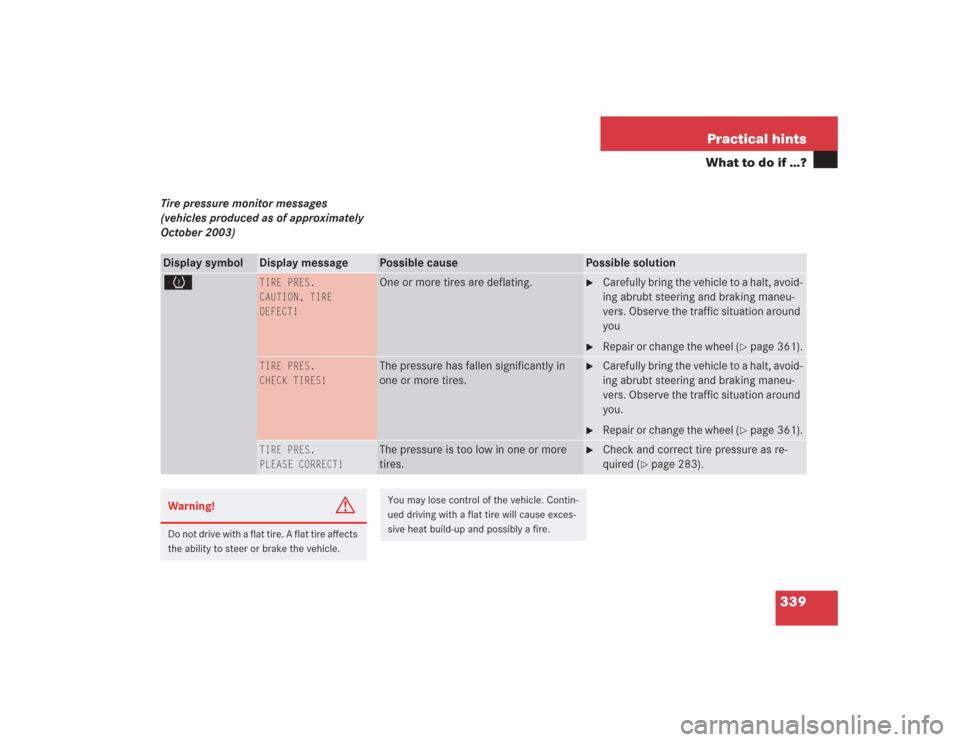
339 Practical hints
What to do if …?
Tire pressure monitor messages
(vehicles produced as of approximately
October 2003)Display symbol
Display message
Possible cause
Possible solution
H
TIRE PRES.
CAUTION, TIRE
DEFECT!
One or more tires are deflating.
�
Carefully bring the vehicle to a halt, avoid-
ing abrubt steering and braking maneu-
vers. Observe the traffic situation around
you
�
Repair or change the wheel (
�page 361).
TIRE PRES.
CHECK TIRES!
The pressure has fallen significantly in
one or more tires.
�
Carefully bring the vehicle to a halt, avoid-
ing abrubt steering and braking maneu-
vers. Observe the traffic situation around
you.
�
Repair or change the wheel (
�page 361).
TIRE PRES.
PLEASE CORRECT!
The pressure is too low in one or more
tires.
�
Check and correct tire pressure as re-
quired (
�page 283).
Warning!
G
Do not drive with a flat tire. A flat tire affects
the ability to steer or brake the vehicle.
You may lose control of the vehicle. Contin-
ued driving with a flat tire will cause exces-
sive heat build-up and possibly a fire.
Page 341 of 435
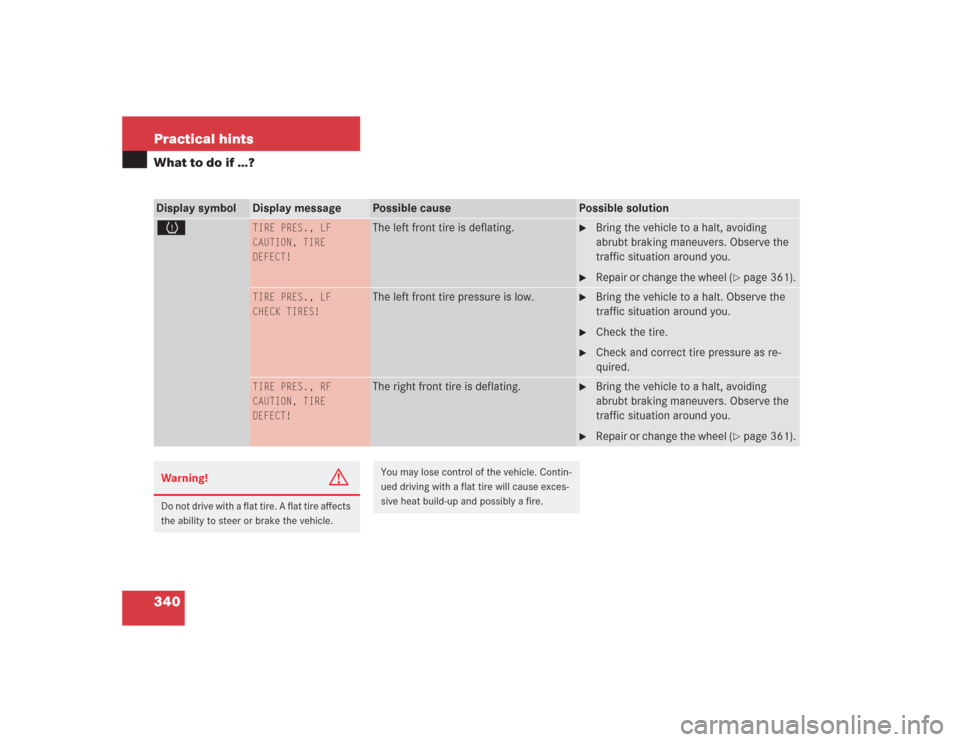
340 Practical hintsWhat to do if …?Display symbol
Display message
Possible cause
Possible solution
H
TIRE PRES., LF
CAUTION, TIRE
DEFECT!
The left front tire is deflating.
�
Bring the vehicle to a halt, avoiding
abrubt braking maneuvers. Observe the
traffic situation around you.
�
Repair or change the wheel (
�page 361).
TIRE PRES., LF
CHECK TIRES!
The left front tire pressure is low.
�
Bring the vehicle to a halt. Observe the
traffic situation around you.
�
Check the tire.
�
Check and correct tire pressure as re-
quired.
TIRE PRES., RF
CAUTION, TIRE
DEFECT!
The right front tire is deflating.
�
Bring the vehicle to a halt, avoiding
abrubt braking maneuvers. Observe the
traffic situation around you.
�
Repair or change the wheel (
�page 361).
Warning!
G
Do not drive with a flat tire. A flat tire affects
the ability to steer or brake the vehicle.
You may lose control of the vehicle. Contin-
ued driving with a flat tire will cause exces-
sive heat build-up and possibly a fire.
Page 342 of 435
341 Practical hints
What to do if …?
Display symbol
Display message
Possible cause
Possible solution
H
TIRE PRES., RF
CHECK TIRES!
The right front tire pressure is low.
�
Bring the vehicle to a halt. Observe the
traffic situation around you.
�
Check the tire.
�
Check and correct tire pressure as re-
quired.
TIRE PRES., LR
CAUTION, TIRE
DEFECT!
The left rear tire is deflating.
�
Bring the vehicle to a halt, avoiding
abrubt braking maneuvers. Observe the
traffic situation around you.
�
Repair or change the wheel (
�page 361).
TIRE PRES., LR
CHECK TIRES!
The left rear tire pressure is low.
�
Bring the vehicle to a halt. Observe the
traffic situation around you.
�
Check the tire.
�
Check and correct tire pressure as re-
quired.
Warning!
G
Do not drive with a flat tire. A flat tire affects
the ability to steer or brake the vehicle.
You may lose control of the vehicle. Contin-
ued driving with a flat tire will cause exces-
sive heat build-up and possibly a fire.
Page 343 of 435
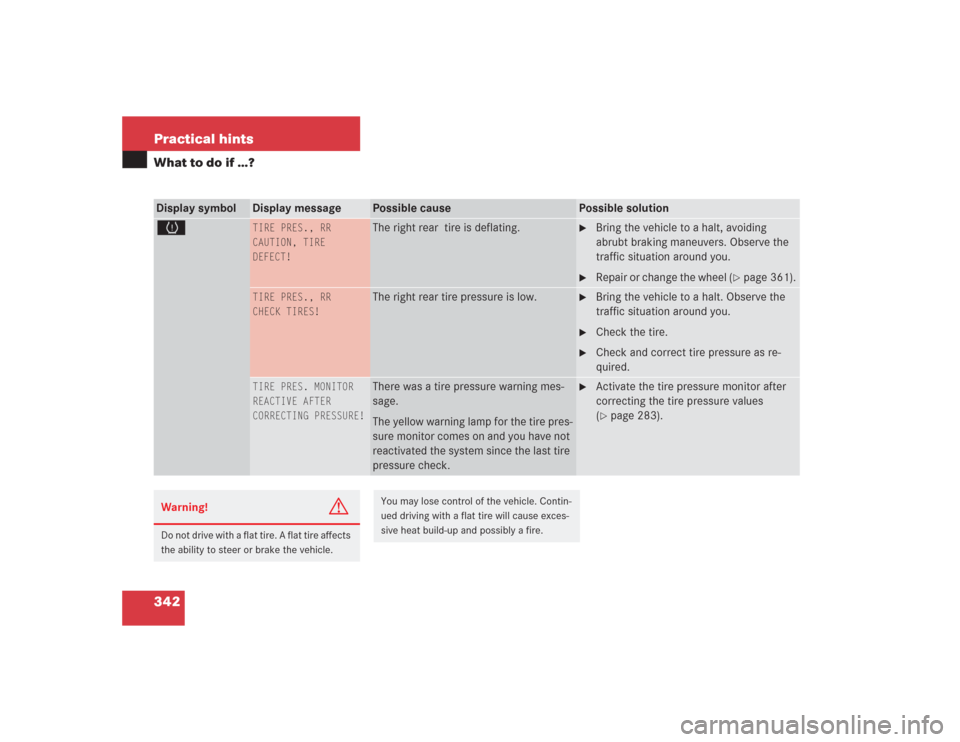
342 Practical hintsWhat to do if …?Display symbol
Display message
Possible cause
Possible solution
H
TIRE PRES., RR
CAUTION, TIRE
DEFECT!
The right rear tire is deflating.
�
Bring the vehicle to a halt, avoiding
abrubt braking maneuvers. Observe the
traffic situation around you.
�
Repair or change the wheel (
�page 361).
TIRE PRES., RR
CHECK TIRES!
The right rear tire pressure is low.
�
Bring the vehicle to a halt. Observe the
traffic situation around you.
�
Check the tire.
�
Check and correct tire pressure as re-
quired.
TIRE PRES. MONITOR
REACTIVE AFTER
CORRECTING PRESSURE!
There was a tire pressure warning mes-
sage.
The yellow warning lamp for the tire pres-
sure monitor comes on and you have not
reactivated the system since the last tire
pressure check.
�
Activate the tire pressure monitor after
correcting the tire pressure values
(�page 283).
Warning!
G
Do not drive with a flat tire. A flat tire affects
the ability to steer or brake the vehicle.
You may lose control of the vehicle. Contin-
ued driving with a flat tire will cause exces-
sive heat build-up and possibly a fire.
Page 344 of 435

343 Practical hints
What to do if …?
Display symbol
Display message
Possible cause
Possible solution
H
TIRE PRES. MONITOR
REACTIVATED
The tire pressure monitor is using the cur-
rent pressure values as the basis for mon-
itoring.
TIRE PRES. MONITOR
CURRENTLY
UNAVAILABLE
The tire inflation pressure monitor* is un-
able to monitor the tire pressure due to:�
the presence of several wheen sen-
sors in the vehicle
�
excessive wheel sensor temperatures
�
a nearby radio interference source
�
unrecognized wheel sensors installed
�
Remove any extra wheel sensors from the
vehicle
As soon as the causes of the malfunction
have been removed, the tire pressure moni-
tor automatically becomes active again.
TIRE PRES. MONITOR
NOT OPERATIONAL
DRIVE TO WORKSHOP
The tire pressure monitor or a wheel sen-
sor is malfunctioning.
�
Have the tire inflation pressure monitor
checked by an authorized Mercedes-Benz
Center.
A wheel without proper sensor was in-
stalled.
�
Have the wheels checked.
Warning!
G
Do not drive with a flat tire. A flat tire affects
the ability to steer or brake the vehicle.
You may lose control of the vehicle. Contin-
ued driving with a flat tire will cause exces-
sive heat build-up and possibly a fire.
Page 348 of 435
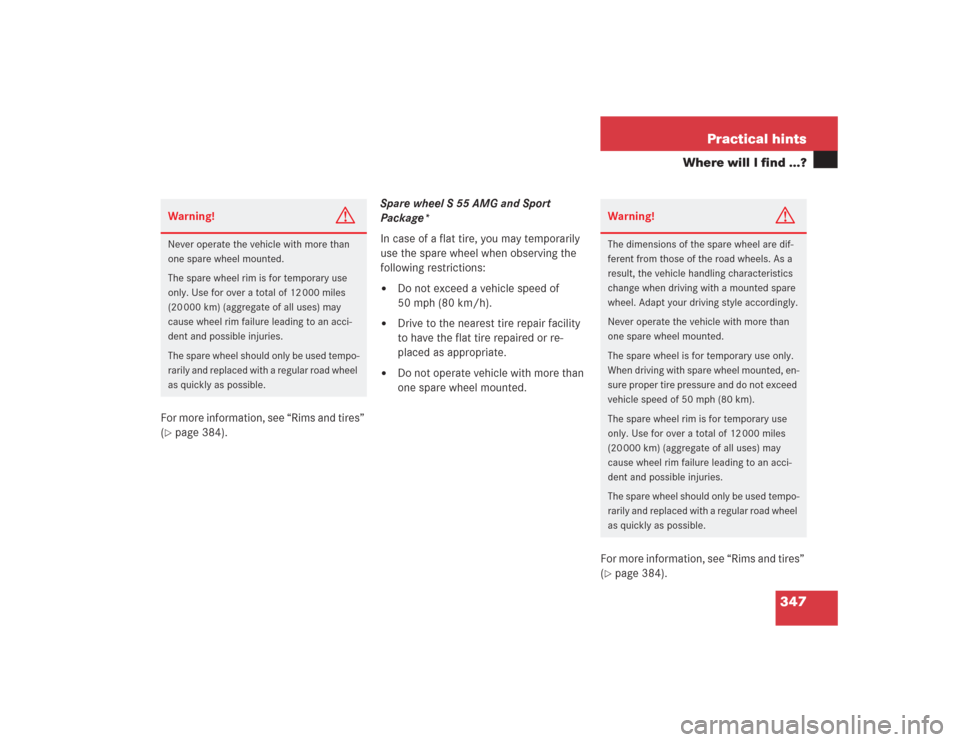
347 Practical hints
Where will I find ...?
For more information, see “Rims and tires”
(�page 384).Spare wheel S 55 AMG and Sport
Package*
In case of a flat tire, you may temporarily
use the spare wheel when observing the
following restrictions:
�
Do not exceed a vehicle speed of
50 mph (80 km/h).
�
Drive to the nearest tire repair facility
to have the flat tire repaired or re-
placed as appropriate.
�
Do not operate vehicle with more than
one spare wheel mounted.
For more information, see “Rims and tires”
(
�page 384).
Warning!
G
Never operate the vehicle with more than
one spare wheel mounted.
The spare wheel rim is for temporary use
only. Use for over a total of 12 000 miles
(20 000 km) (aggregate of all uses) may
cause wheel rim failure leading to an acci-
dent and possible injuries.
The spare wheel should only be used tempo-
rarily and replaced with a regular road wheel
as quickly as possible.
Warning!
G
The dimensions of the spare wheel are dif-
ferent from those of the road wheels. As a
result, the vehicle handling characteristics
change when driving with a mounted spare
wheel. Adapt your driving style accordingly.
Never operate the vehicle with more than
one spare wheel mounted.
The spare wheel is for temporary use only.
When driving with spare wheel mounted, en-
sure proper tire pressure and do not exceed
vehicle speed of 50 mph (80 km).
The spare wheel rim is for temporary use
only. Use for over a total of 12 000 miles
(20 000 km) (aggregate of all uses) may
cause wheel rim failure leading to an acci-
dent and possible injuries.
The spare wheel should only be used tempo-
rarily and replaced with a regular road wheel
as quickly as possible.
Page 362 of 435
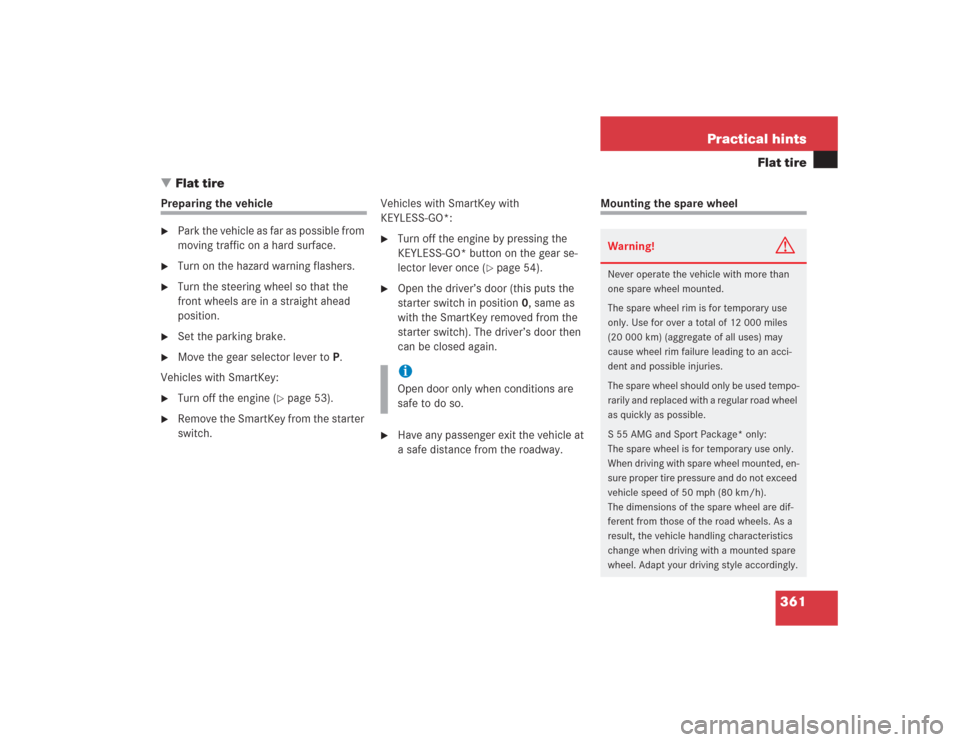
361 Practical hints
Flat tire
�Flat tire
Preparing the vehicle�
Park the vehicle as far as possible from
moving traffic on a hard surface.
�
Turn on the hazard warning flashers.
�
Turn the steering wheel so that the
front wheels are in a straight ahead
position.
�
Set the parking brake.
�
Move the gear selector lever toP.
Vehicles with SmartKey:
�
Turn off the engine (
�page 53).
�
Remove the SmartKey from the starter
switch.Vehicles with SmartKey with
KEYLESS-GO*:
�
Turn off the engine by pressing the
KEYLESS-GO* button on the gear se-
lector lever once (
�page 54).
�
Open the driver’s door (this puts the
starter switch in position0, same as
with the SmartKey removed from the
starter switch). The driver’s door then
can be closed again.
�
Have any passenger exit the vehicle at
a safe distance from the roadway.
Mounting the spare wheel
iOpen door only when conditions are
safe to do so.
Warning!
G
Never operate the vehicle with more than
one spare wheel mounted.
The spare wheel rim is for temporary use
only. Use for over a total of 12 000 miles
(20 000 km) (aggregate of all uses) may
cause wheel rim failure leading to an acci-
dent and possible injuries.
The spare wheel should only be used tempo-
rarily and replaced with a regular road wheel
as quickly as possible.
S 55 AMG and Sport Package* only:
The spare wheel is for temporary use only.
When driving with spare wheel mounted, en-
sure proper tire pressure and do not exceed
vehicle speed of 50 mph (80 km/h).
The dimensions of the spare wheel are dif-
ferent from those of the road wheels. As a
result, the vehicle handling characteristics
change when driving with a mounted spare
wheel. Adapt your driving style accordingly.
Page 366 of 435
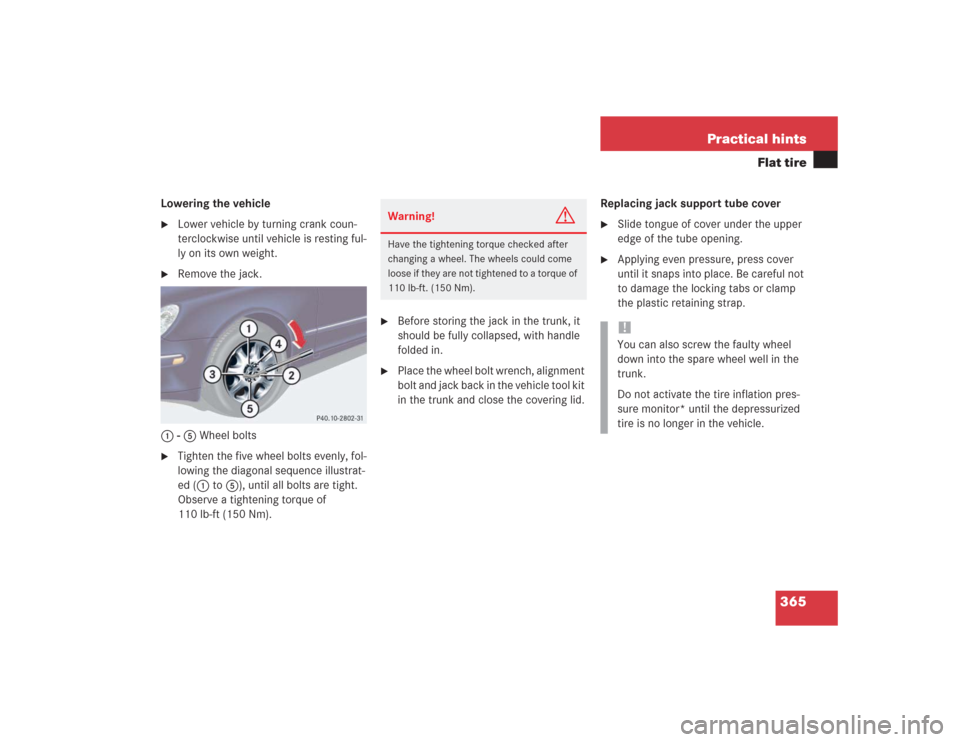
365 Practical hints
Flat tire
Lowering the vehicle�
Lower vehicle by turning crank coun-
terclockwise until vehicle is resting ful-
ly on its own weight.
�
Remove the jack.
1 - 5 Wheel bolts
�
Tighten the five wheel bolts evenly, fol-
lowing the diagonal sequence illustrat-
ed (1 to 5), until all bolts are tight.
Observe a tightening torque of
110 lb-ft (150 Nm).
�
Before storing the jack in the trunk, it
should be fully collapsed, with handle
folded in.
�
Place the wheel bolt wrench, alignment
bolt and jack back in the vehicle tool kit
in the trunk and close the covering lid.Replacing jack support tube cover
�
Slide tongue of cover under the upper
edge of the tube opening.
�
Applying even pressure, press cover
until it snaps into place. Be careful not
to damage the locking tabs or clamp
the plastic retaining strap.
Warning!
G
Have the tightening torque checked after
changing a wheel. The wheels could come
loose if they are not tightened to a torque of
110 lb-ft. (150 Nm).
!You can also screw the faulty wheel
down into the spare wheel well in the
trunk.
Do not activate the tire inflation pres-
sure monitor* until the depressurized
tire is no longer in the vehicle.